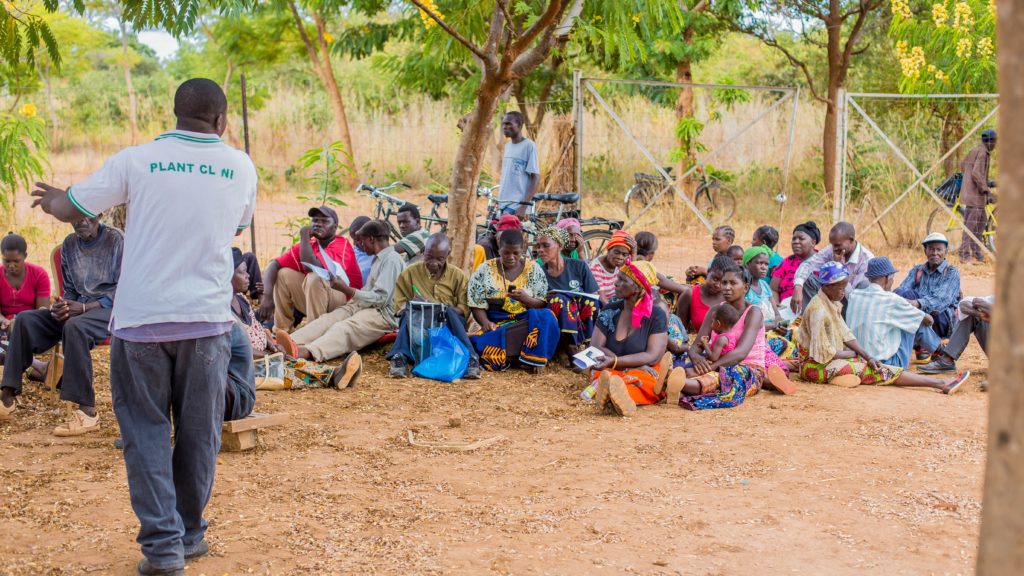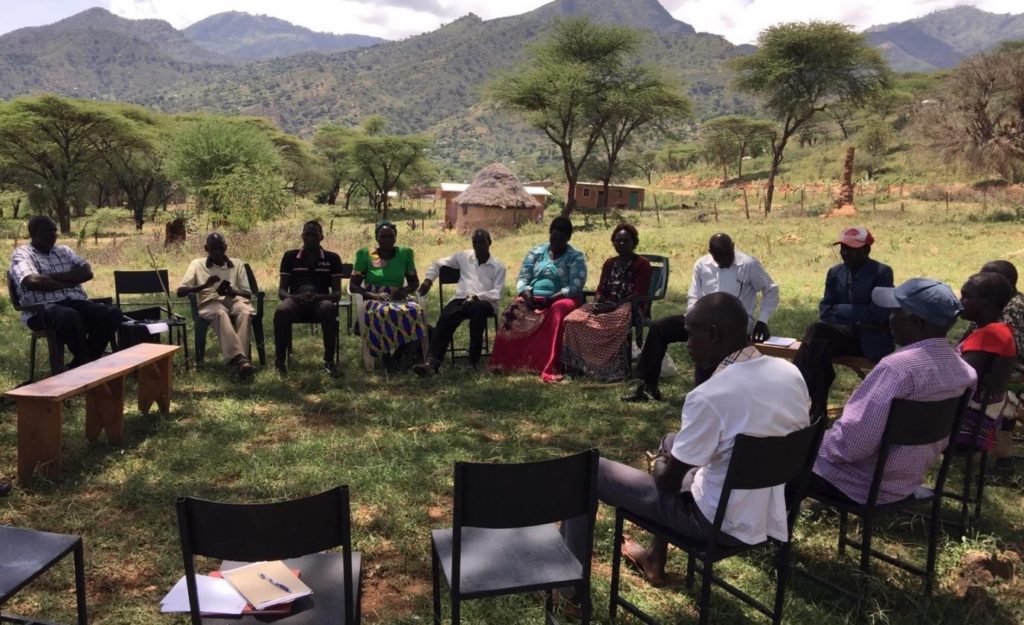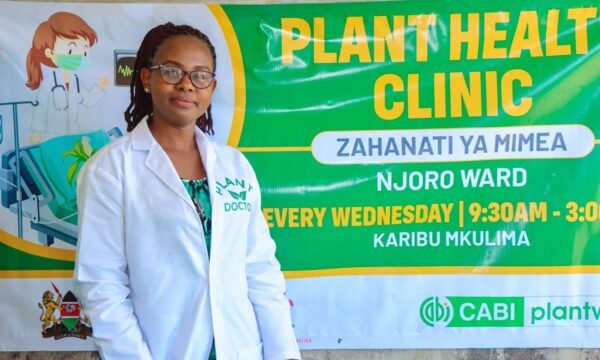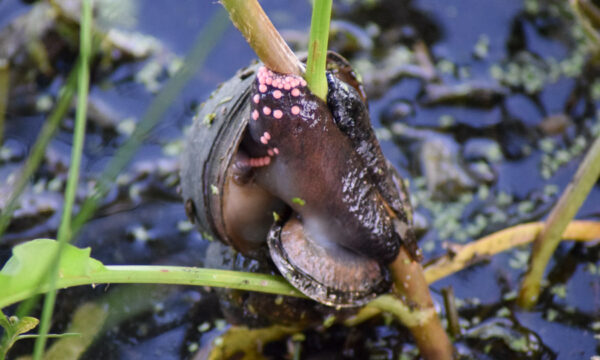
Agricultural advisory services are a critical factor to promoting agricultural development, and investments in extension services are potentially important tools for improving agricultural productivity and increasing farmers’ incomes, two desirable outcomes of food security and poverty reduction articulated in MDGs and SDGs.
Last year, CABI received a grant from Corteva Agriscience (formerly Dow Agrosciences) to support Plantwise program activities in the Academic Model Providing Access to Healthcare (AMPATH) program areas. Through this grant, Plantwise Kenya in partnership with AMPATH and county governments in Western and Rift Valley has trained several plant doctors, who operate plant clinics providing agricultural advice to farmers to improve household food security and incomes. As part of this, one of the main objectives is focussed on engaging the youth in agriculture for productive and gainful employment, to contribute in reducing the high rates of youth unemployment.
For two weeks in October and November, the Plantwise Kenya and AMPATH teams visited Elgeyo-Marakwet County to explore and assess opportunities for engaging young people in providing agricultural advisory services to farmers. The majority of the farmers are members of cooperatives supported by AMPATH on livelihood-based interventions. The aim of this work was to assess whether farmers can pay for agricultural advisory services, to engage and gainfully employ the youth in agriculture.
Elgeyo-Marakwet is one of the 47 counties in Kenya, located in the former Rift Valley province. The county straddles two distinct topographies; the highlands and lowlands. The highlands are endowed with rich alluvial soils and reliable rainfall, enabling abundant production of crops like Irish potatoes, maize, beans, cabbage, kales, snow peas for export. The lowlands lie at the floor of the Kerio-valley, and despite being extremely hot the year-round, and dry during some parts of the year, lead in the production of mangoes, tomato, watermelon and green grams. The fruits and vegetables are marketed as far as Nairobi. Some of the key pest problems include: mango fruit fly, anthracnose and powdery mildew, melon fly and chafer grub, aphids on green grams, tuta absoluta and bacterial wilt on tomato, and fall armyworm.


Besides crop farming, the farmers in the county keep livestock – cattle, sheep and goats. For many years, livestock have been a major cause of high insecurity between two neighbouring communities, the Marakwet and Pokot, fuelled by the retrogressive practice of cattle rustling. Many people have been killed and permanently maimed, property destroyed, whole villages displaced and normal life disrupted because of this practice. In this county, indigenous irrigation through hand-constructed furrows has been practiced for over a century.
The teams held focus group discussions and key informant interviews with members of farmer cooperatives, leaders of youth groups, and a few individual farmers. Jointly, the partners are exploring opportunities that can engage the youth in providing agricultural advisory services to farmers, and participate in various activities along various crop value chains. The assessment focussed on; what are the key crops farmers produce? What are the major pests and disease challenges for the crops? Where do farmers obtain agricultural advisory services? What services are the youths providing in agriculture sector?
What is evident is that there are young people qualified with certificates and diplomas in agriculture and can provide a variety services to farmers, including agriculture extension advice. The youth are energetic, innovative, qualified, and are the future. However, throughout discussions with farmers, it emerged that they are not willing to pay for purely agricultural or plant health advice. They can get these services for free from County agricultural extension agents. And in fact, some youths are providing these services on voluntary basis as a way of paying back to the community that paid for their education. All this notwithstanding the fact that the youth have financial needs.
When asked why they pay for veterinary services and cannot pay for crops advisory services, the farmers said that the vet officer comes to treat animals equipped with drugs and medicines. In this region, cattle are held in high regard because they are a source of wealth and confer social status to individuals in the community. The farmers were categorical that they can pay for a bundle of services, but not purely agricultural advice.
For them to consider paying for agricultural advice, the person providing advice should come along with chemicals to treat the affected crops, or as one farmer put it, and with gestures for effect, “the individual should carry a pesticide in one pocket and a fungicide in the other pocket.”

It is not surprising then that farmers are not willing to pay for agricultural advice alone. For the youth to be considered as providing valuable services, they must offer a bundle of services; diagnosing the crop health problems, recommending measures to manage the problems, provide spraying services, pruning and grafting fruit trees to improve the local varieties, etc. The farmers strongly hold this notion even when mangoes generate an average of up to USD 1,500 in a season, and the tomatoes up to USD 3,000 in a year, for some farmers.
This finding is contrary to evidence that farmers are willing, and indeed do pay for agricultural advisory services; if they perceive the advice as being of good quality, the services are closer, there is profit at the end of it all, they can easily access markets for produce and inputs.
Given the value perception of services by farmers, Plantwise Kenya and partners need to focus on equipping young people with additional knowledge and skills, that are value-chain specific, to enable them provide a bundle of services that farmers would pay for.
Find out more: CABI: Gender and youth
Related News & Blogs
Biocontrol that goes the distance: Acerophagus papayae in Kenya
Acerophagus papayae can slow the spread of the invasive papaya mealybug and benefit the wider community. Recent monitoring efforts have shown that the natural enemy is reaching long distances away from the original release sites. Papaya mealybug attack…
20 May 2025




